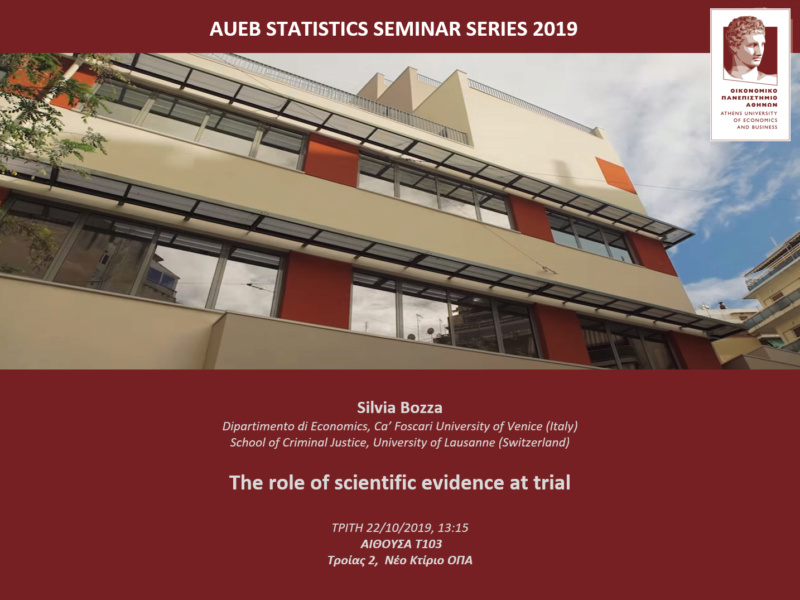 AUEB STATS SEMINARS 22/10/2019: The role of scientific evidence at trial by Silvia Bozza
AUEB STATS SEMINARS 22/10/2019: The role of scientific evidence at trial by Silvia Bozza
Fri 11 Oct 2019 - 15:21
AUEB STATISTICS SEMINAR SERIES
OCTOBER 2019

Silvia Bozza
Dipartimento di Economics, Ca’ Foscari University of Venice (Italy)
School of Criminal Justice, University of Lausanne (Switzerland)
The role of scientific evidence at trial
TUESDAY 22/10/2019, 13:15
Room Τ103,
Troias 2, New AUEB Building
ABSTRACT
Forensic scientists are typically confronted with the evaluation of the probative strength of a link between characteristics of recovered trace evidence and of material taken for comparative purposes. Categorical conclusions are unwarranted because of recurrent constraints in the form of limited and incomplete information and assessing the probative strength of scientific results in the light of multiple sources of uncertainty represents the regular case in forensic science. What is more, the interpretation of scientific results in applied scenarios of interest requires the construction of arguments in a balanced, logical, robust and transparent way.
Elements of probability theory and Bayesian reasoning can be meaningfully applied to help resolve questions of inference at the intersection between forensic science and the law, and support scientists in their interaction with recipients of expert information in the legal process. The assessment of the value of scientific evidence is commonly considered through the derivation of a Bayes factor, a rigorous concept that provides a balanced measure of the degree to which the evidence is capable of discriminating among competing propositions. Its use is well established and largely supported by operational standards and recommendations in many forensic disciplines. However, the progress about a widespread consensus about foundational principles is fragile, and opinions about what should be an appropriate way to deal with such sources of uncertainty while presenting expressions of evidential value at trial differ. It often is argued that any conclusion based on subjective evaluations will be perceived by the recipient of expert information as arbitrary and liable to criticisms as guesswork, and that larger efforts should be devoted to maximize objectivity and avoiding personal viewpoints. Following this line of reasoning, it is not infrequent to find positions suggesting to report a range of values while presenting expressions of evidential value at trial. Such partial probability assignments may however not make good use of available information.
Facebook event: https://www.facebook.com/events/992695117742349/
OCTOBER 2019

Silvia Bozza
Dipartimento di Economics, Ca’ Foscari University of Venice (Italy)
School of Criminal Justice, University of Lausanne (Switzerland)
The role of scientific evidence at trial
TUESDAY 22/10/2019, 13:15
Room Τ103,
Troias 2, New AUEB Building
ABSTRACT
Forensic scientists are typically confronted with the evaluation of the probative strength of a link between characteristics of recovered trace evidence and of material taken for comparative purposes. Categorical conclusions are unwarranted because of recurrent constraints in the form of limited and incomplete information and assessing the probative strength of scientific results in the light of multiple sources of uncertainty represents the regular case in forensic science. What is more, the interpretation of scientific results in applied scenarios of interest requires the construction of arguments in a balanced, logical, robust and transparent way.
Elements of probability theory and Bayesian reasoning can be meaningfully applied to help resolve questions of inference at the intersection between forensic science and the law, and support scientists in their interaction with recipients of expert information in the legal process. The assessment of the value of scientific evidence is commonly considered through the derivation of a Bayes factor, a rigorous concept that provides a balanced measure of the degree to which the evidence is capable of discriminating among competing propositions. Its use is well established and largely supported by operational standards and recommendations in many forensic disciplines. However, the progress about a widespread consensus about foundational principles is fragile, and opinions about what should be an appropriate way to deal with such sources of uncertainty while presenting expressions of evidential value at trial differ. It often is argued that any conclusion based on subjective evaluations will be perceived by the recipient of expert information as arbitrary and liable to criticisms as guesswork, and that larger efforts should be devoted to maximize objectivity and avoiding personal viewpoints. Following this line of reasoning, it is not infrequent to find positions suggesting to report a range of values while presenting expressions of evidential value at trial. Such partial probability assignments may however not make good use of available information.
Facebook event: https://www.facebook.com/events/992695117742349/
Permissions in this forum:
You cannot reply to topics in this forum

 Grstats
Grstats
